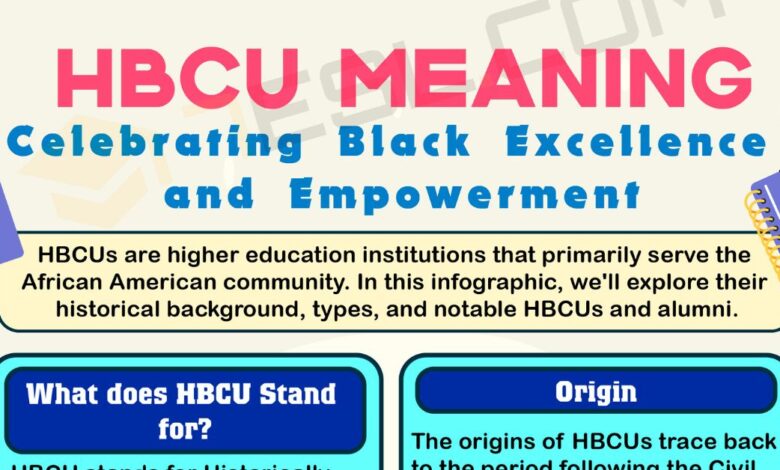Understanding HBCU Meaning: A Deep Dive into Historically Black Colleges and Universities

When we talk about education in the United States, one term that often comes up is “Hbcu meaning.” So, what does HBCU mean? This acronym stands for Historically Black Colleges and Universities, institutions established to provide higher education to African American students during a time when they were largely excluded from mainstream educational opportunities. In this article, we will explore the history, significance, and impact of HBCUs on students and society as a whole.
The Origins of HBCUs

Historically Black Colleges and Universities Hbcu meaning have a rich history that dates back to the 19th century. Let’s take a closer look at how these institutions came to be:
Early Beginnings
- Before HBCUs: In the early days of American education, many African Americans were denied access to schooling. They were often forced to attend segregated schools or, in many cases, had no access to education at all.
- Establishment: The first HBCU, Cheyney University of Pennsylvania, was founded in 1837. It was created to provide education to African American students who were denied admission to other colleges.
Growth and Development
- Post-Civil War Era: After the Civil War, there was a significant increase in the establishment of HBCUs. The U.S. government and various religious organizations played a crucial role in funding these institutions to educate formerly enslaved individuals and their descendants.
- Land-Grant Institutions: In 1890, the Second Morrill Act allowed states to establish land-grant colleges for African Americans, further increasing the number of HBCUs.
HBCU Meaning in Today’s Context
The meaning of HBCU has evolved over the years. Today, it encompasses more than just educational institutions; it represents a legacy of resilience, culture, and community. Here’s what makes HBCUs unique:
Educational Excellence
- Academic Programs: HBCUs offer a wide range of degree programs across various fields, including science, technology, engineering, arts, and humanities.
- Focus on African American History: Many HBCUs incorporate African American history and culture into their curricula, allowing students to explore their heritage and identity.
Community and Support
- Nurturing Environment: HBCUs often provide a supportive environment that fosters academic achievement and personal growth. They emphasize mentorship and community engagement.
- Cultural Identity: HBCUs celebrate African American culture through events, organizations, and traditions, creating a sense of belonging for students.
The Impact of HBCUs on Society
HBCUs have made significant contributions not only to their students but also to society at large. Let’s explore some of the key impacts:
Educating Leaders
- Notable Alumni: Many successful African American leaders, including politicians, business executives, and cultural icons, are HBCU graduates. Figures like Kamala Harris (Howard University) and Oprah Winfrey (Tennessee State University) highlight the caliber of education at these institutions.
- Empowerment: HBCUs empower students to pursue their dreams and become leaders in their communities.
Economic Contributions
- Job Creation: HBCUs contribute to the economy by creating jobs, both directly through employment and indirectly through their impact on local businesses and communities.
- Alumni Networks: HBCU graduates often give back to their institutions and communities, fostering economic development.
The Challenges HBCUs Face
Despite their many contributions, HBCUs also face several challenges. Understanding these challenges is crucial to appreciating their significance:
Funding Issues
- Financial Struggles: Many HBCUs experience funding disparities compared to predominantly white institutions (PWIs). This can impact the quality of education and resources available to students.
- Need for Support: There is an ongoing need for increased financial support from the government and private sectors to ensure the sustainability of HBCUs.
Enrollment Declines
- Changing Demographics: Some HBCUs have seen declines in enrollment due to demographic shifts and the increasing competition from other institutions.
- Awareness and Outreach: Many students are unaware of the benefits of attending HBCUs, leading to a need for greater outreach efforts.
Celebrating HBCU Culture
HBCUs are not just educational institutions; they are cultural hubs that celebrate African American heritage and pride. Here’s how they do it:
Events and Traditions
- Homecoming: Homecoming events at HBCUs are vibrant celebrations filled with parades, sports, and reunions that foster school spirit and community.
- Cultural Programs: Many HBCUs host cultural events, such as Black History Month celebrations, lectures, and performances, to honor African American contributions to society.
Student Organizations
- Greek Life: Fraternities and sororities, particularly those founded by and for African Americans, play an essential role in the social and cultural life of HBCUs.
- Activism: Many student organizations focus on social justice, empowering students to engage with issues affecting their communities.
Future of HBCUs
As we look to the future, HBCUs are adapting to meet the challenges and opportunities of the modern educational landscape:
Embracing Technology
- Online Education: Many HBCUs are expanding their online course offerings, making education more accessible to students who may not be able to attend in person.
- STEM Programs: A focus on science, technology, engineering, and mathematics (STEM) programs is essential for preparing students for the jobs of the future.
Strengthening Partnerships
- Collaborations with PWIs: Increasing partnerships between HBCUs and predominantly white institutions can help share resources and create more opportunities for students.
- Community Engagement: Strengthening ties with local communities can enhance the impact of HBCUs and their graduates.
Conclusion: Understanding HBCU Meaning and Importance
In conclusion, understanding the meaning of HBCUs is crucial to appreciating their significant role in American education and society. These institutions embody a legacy of resilience, empowerment, and community. HBCUs provide not only education but also a nurturing environment that celebrates African American culture and identity.
As we continue to support and uplift these vital institutions, we acknowledge their contributions to shaping leaders and enriching society. The future of HBCUs is bright, and their impact will resonate for generations to come. So, when you hear the term “HBCU,” remember that it stands for much more than just schools—it represents a powerful movement toward education, empowerment, and equality.





